What’s it like to learn on Coursera? Find out in Whop’s comprehensive Coursera review.
Key takeaways
- Coursera offers diverse learning paths from free introductory courses to full accredited degrees from top universities.
- Professional Certificates from companies like Google and Meta prepare career changers for entry-level jobs in months.
- The platform relies on automated marking and peer review, which may not suit learners seeking direct instructor interaction.
Coursera has become one of the go-to platforms for students worldwide who want to study with leading colleges and organizations.
From micro-courses that last an hour to full degrees and professional certificates, Coursera offers a mind-blowing range of options.
However, the mass learning environment's reliance on automated marking and peer review may not be right for everyone.
In our comprehensive Coursera review, we take a deep dive into all aspects of the platform. By the end, you’ll know if Coursera is the right place for you to learn and achieve your goals.
Plus, discover how Whop’s expert-led communities are designed to deliver hands-on learning with a personal touch.
What is Coursera?
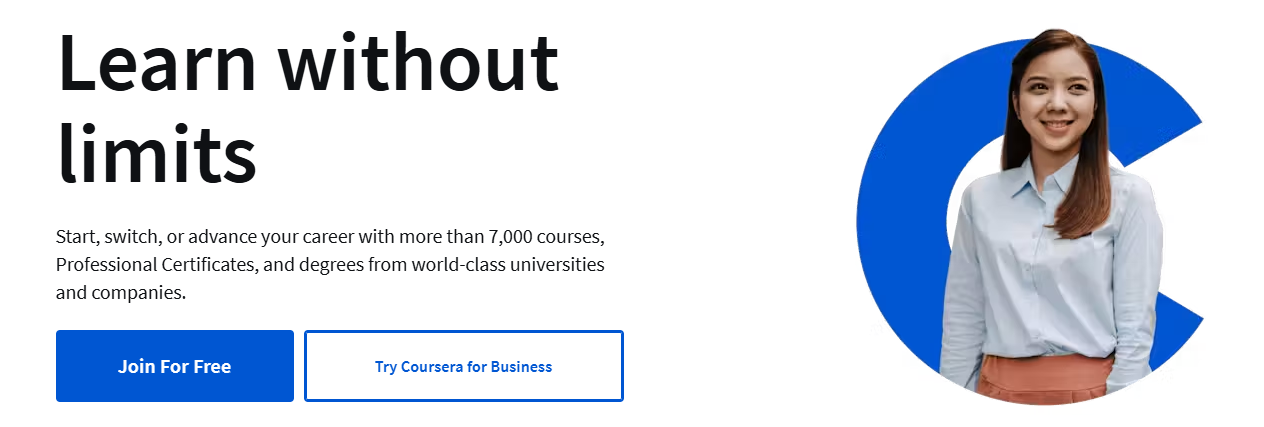
Founded in 2012 and headquartered in California, Coursera is one of the more familiar names in the world of online learning. Its ethos is to make quality education available to everyone, wherever they are in the world.
Coursera boasts around 113 million learners worldwide and partnerships with 7.5k+ enterprises, government bodies, and educational institutions.
Coursera has partnered with lots of impressive colleges, universities, and organizations, including:

Through its partners, Coursera is able to offer a range of standalone courses, certificates, and even full degrees.
It also offers MOOCs (Massive Open Online Courses), which are free courses with no prerequisites for entry (except for internet access).
We’ll delve into how learners can sign up and use the platform later in this Coursera review.
First up, we’ll look at what you can learn and the (many) different course options.
What can you learn on Coursera?

Browse the range of Coursera courses and you’ll see the emphasis is on academic study and career-based skills. You can find programs related to business, computing, engineering, and social sciences.
There are also options for learning a second language, journalism, writing, and other arts/humanities subjects.
In short, you name it, you can probably find a course in it on Coursera.
However, it may not be the best place to learn everything. As we’ll cover later, some Coursera courses have little (if any) direct interaction with the teacher.
Coursera courses & programs
Coursera has a range of ways you can learn, whatever your budget, commitment, or desired outcome. There are also multi-lingual options available for learners who are not English speakers.
You can study at your own pace and the level (beginner, intermediate, etc.) is indicated on the course page. For most courses, there is no application process—you just enroll and start learning. We’ll take you through this a little later in the review.
The main Coursera program types are:
🎓 Guided Projects
🎓 Free courses
🎓 Standalone courses
🎓 Specializations
🎓 Professional Certificates
🎓 MasterTrack Certificates
🎓 University Certificates
🎓 Degrees
We’ll cover the cost of each option on Coursera later in the review. However, here is an overview of what each course type is all about:
Guided Projects

Guided Projects are standalone micro-courses that teach a specific skill or offer an introduction to a subject through a hands-on project. They are aimed at beginners or intermediates.
The projects are slightly different from typical Coursera courses. They form part of the Coursera Project Network, a select group of independent instructors from academia and industry.

While pre-recorded, the courses are more practical and interactive than most Coursera offerings. A “career certificate” is available upon successful completion.
Sample course: Adobe Premiere Pro for Beginners: Quickstart Video-Editing
- 1.5 hours to complete
- Beginner level
- Using a split screen, the instructor walks students through Adobe Premiere Pro as they complete a real-world editing project
- Includes a 30-day Adobe Creative Cloud Suite subscription
Free courses
MOOCs are a good way to get a taste of a subject and try out Coursera for free. There are thousands of free courses on Coursera that provide foundational-level or intermediate skills.
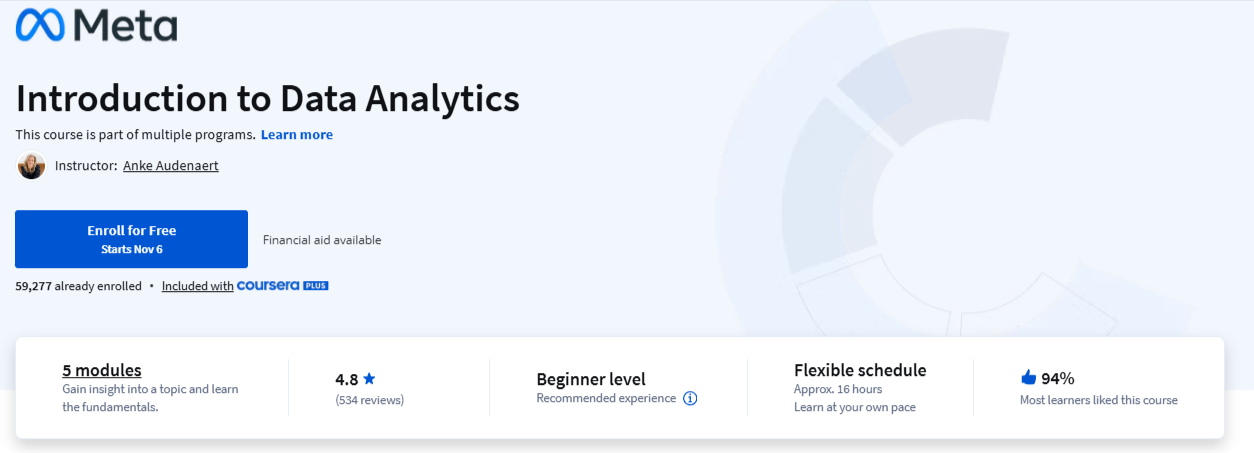
One thing to note is that “free” on Coursera generally means you can access or “audit” the course content without paying anything. If you want to do the graded assessments along the way and get a shareable certificate as proof of completion at the end, there’s a charge.
Sample course: Introduction to Data Analytics (Meta)
- Around 16 hours to complete
- Beginner level
- Study 5 modules: What is data analytics?; The data ecosystem; Gathering & wrangling data; Mining & visual data and communicating results; Career opportunities and data analysis in action
Standalone courses
Single, standalone courses are available in a range of subjects. They cover the same ground as the free courses, but paying means you gain access to the assessment portion.
Course length and hourly commitment per week vary. They can last anywhere from a few hours to a few weeks. The time it takes really depends on the individual learner.

As with the free courses, they are usually divided into separate modules. You work through the material in your own time and complete any quizzes or assignments along the way. A certificate is available if you successfully complete all the modules and assessments.
Many standalone courses form part of longer Specializations or apply towards other types of programs on the site.
Sample course: Fundamentals of Graphic Design (CalArts)
- Around 15 hours to complete
- Beginner level
- Forms part of the 5-course Graphic Design Specialization
- Study 6 modules: Overview; Fundamentals of image making; Fundamentals of typography; Fundamentals of shape and color; Fundamentals of composition; Continuing your graphic design studies
Specializations
Coursera’s Specializations are collections of related courses leading to a single qualification, with a career certificate you can share on LinkedIn and elsewhere. Specializations can provide credit towards a degree in that subject.

You enroll and work through each course in turn, with no obligation to complete the whole Specialization. As you complete one course, you can claim the certificate and go no further. Alternatively, you can take a break and come back later to complete the other courses in the series.

The final course in a specialization is often a Capstone, which lets learners put what they’ve learned into practice. For example, a marketing course might have four theory courses with the fifth requiring students to develop a marketing plan for a fictional company.
Sample course: Strategic Leadership and Management Specialization (University of Illinois Urbana-Champaign)
- Around 2 months to complete
- Beginner level
- Builds towards a degree (including the iMBA)
- Study 6 standalone courses: Developing as a leader; Building effective team cultures; Designing the organization; Managing the organization; Business strategy; Corporate strategy
- Complete the Strategic Leadership and Management Capstone
Professional Certificates
Professional Certificates are recognized and accredited courses offered by companies including Google, Meta, IBM, and Microsoft. They are focused on work-based skills, including marketing, AI, and software development.

These courses are designed for career changers and anyone looking for a practical qualification that prepares them for an entry-level job. They take around six months to complete and college credit may be available. Some come with career guidance to help graduates land a job.

There might also be the opportunity to pursue further professional qualifications and accreditations. For example, the Microsoft Project Management Professional Certificate prepares students to sit the Project Management Professional (PMP) certification exam.
Sample course: Microsoft IT Support Specialist Professional Certificate
- Around 3 months to complete
- Beginner level
- Work towards the MS-900 Certification Exam (extra charge applies)
- Access to career resources upon completion (including a resume review)
- Study 6 courses: Introduction to computers; Introduction to secure networking; Essential aspects of software, hardware & data back-up; Cybersecurity & privacy; Microsoft 365 ecosystem; Technical diagnostics and troubleshooting techniques
Looking to change careers? Discover high-income skills in our post.
MasterTrack Certificates
If you’re not ready to commit to a degree or don’t meet the requirements, Coursera offers a range of MasterTrack Certificates. These standalone qualifications take up to 6 months to complete and offer credit towards a full degree in that subject.

Applying to these courses is less stringent than enrolling in a degree. As such, they are a good option for students who want to progress toward a degree but lack the necessary background in the subject.
Sample course: MasterTrack Certificate in Sustainability and Development (University of Michigan)
- Around 4-6 months to complete
- Counts towards the University of Michigan’s Master of Science in Environment and Sustainability program
- Live sessions during the course
- Complete real-world projects (Capstones)
- Study 3 other courses: Beyond the Sustainable Development Goals; Gender and quality education for sustainability; Methods/skills in sustainability and development
University Certificates
These 100% online academic courses are designed for entry into further study or to allow students to gain a graduate qualification. They take between a few months and a couple of years to complete.

University Certificates follow the college admission or application process and are priced accordingly. They often ask for a bachelor’s degree with professional experience or impose other eligibility requirements.
Sample course: Financial Management Graduate Certificate (Gies College of Business)
- Around 5-24 months to complete
- Bachelor’s degree required for entry
- Prepares students for the University of Illinois’ iMBA, iMSA, and iMSM programs
- Study 3 courses: Accounting measurement, reporting, and control; Investments; Corporate finance
Degrees
Finally, full degrees at both bachelor’s and master’s levels are available through Coursera. They typically take between two years for an MA and four years for a BA. Learners can study online at some of the world’s leading institutions for degrees in such subjects as:
📜 Business/marketing
📜 Data science/analytics
📜 Engineering
📜 Computer science
📜 Public health
Given the advanced levels, these courses are a little different from the other Coursera offerings in terms of application and fees. Students need to apply to enroll in these courses, as they would if they went directly through the college or university. There are also likely to be entry requirements, such as previous study or professional equivalent.
Fees are more in line with normal university tuition than with other Coursera offerings, so they are a significant commitment.
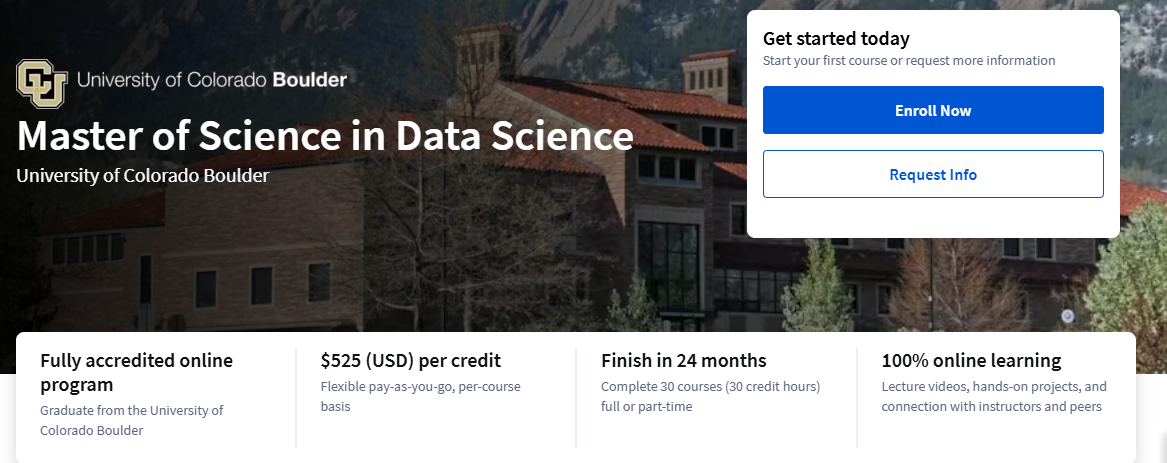
Sample course: Master of Science in Data Science (University of Colorado, Boulder)
- Around 24 months to complete
- 30 credit hours
- Live office hours with instructors and staff
- Take a total of 30 credits across computer science or statistics, core courses, vital skills courses, and electives
As you can see, Coursera offers a number of learning options and subjects to choose from. This can be confusing if you’re not sure what you want to study or at what level.
Think you need to invest $1,000s in a college education? Think again. Check out our post on landing a 6-figure job without a degree.
Coursera Plus
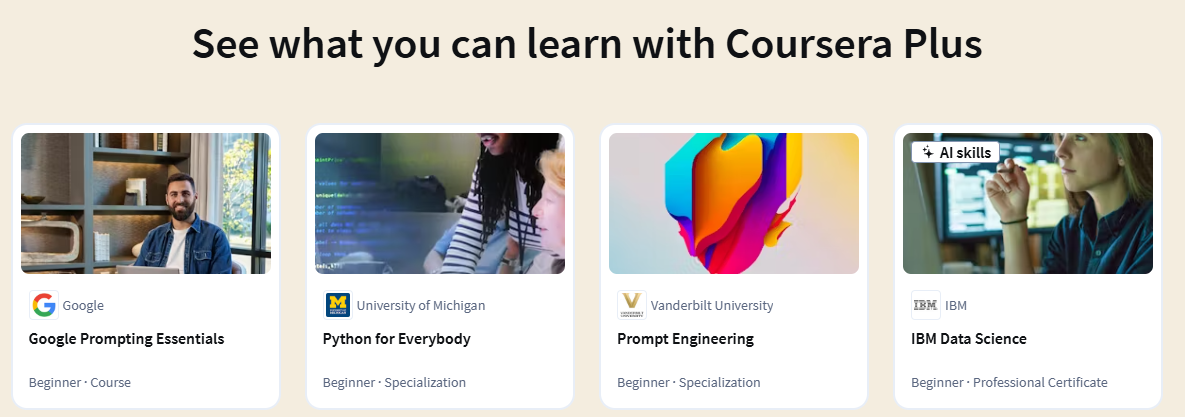
For students who want to study multiple courses, there is a subscription option: Coursera Plus. This unlocks over 7k Coursera courses for a single payment (paid either monthly or annually—full details below).
The subscription covers most:
✅ Guided Projects
✅ Standalone courses
✅ Specializations
✅ Professional Certificates
It does not cover:
❌ MasterTrack Certificates
❌ University Certificates
❌ Degrees
A few of the courses, Specializations, and Professional Certificate programs are also excluded. A Coursera Plus badge is displayed on pages for courses that fall under the subscription, so make sure you check before you sign up.
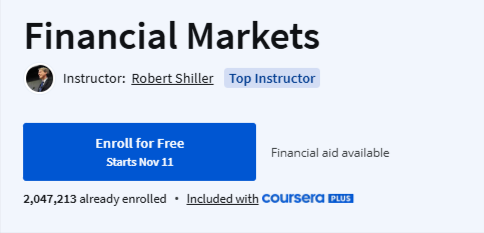
Before signing up for Coursera Plus, review how you plan to engage with the platform. If you’re interested in regular study, a subscription might prove to be a more budget option over the long term.
Signing up to learn on Coursera
The process of signing up for Coursera courses is easy. As we said above, applying for degree-level courses is a little different. However, here are the basic steps to get started.
1. On the homepage, click “Join For Free” (in the top left of the screen)
2. Add your name and email, and choose a strong password. You can also opt to use your existing Google, Facebook, or Apple accounts.
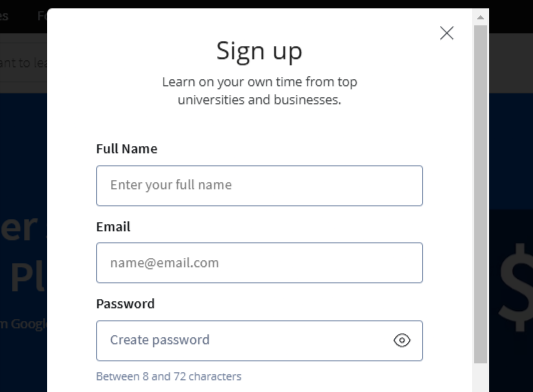
3. Once you’ve signed up, you can access your dashboard. This is where you change your settings and view details of any courses you have completed or which are in progress. You can also download and share any certificates you’ve earned.
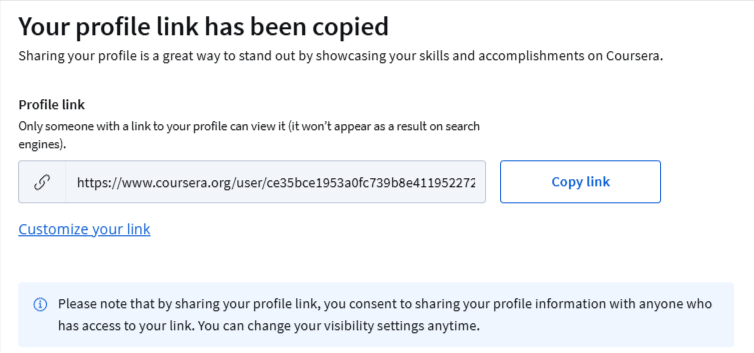
In the “Account Profile” section, you can find your personal profile link to share online. Anyone clicking on this link can see your accomplishments. There’s space to add work experience and other non-Coursera education, so it works a bit like an online resume.
4. Enroll in a course by locating the page and hitting “Enroll” to access the materials.

You can basically ignore the start date—most courses are pre-recorded and available on demand. There are some exceptions to this, which will be outlined on the course page.
How to learn on Coursera
So, how do courses work on Coursera?
Given that the majority of Coursera courses are open to all learners, we’re talking about a mass learning environment, with little (if any) direct access to the teacher.
The exceptions are the degree (and University Certificate) programs, which have a more formal teaching and assessment structure.
For the standalone courses and Specializations, you’ll see some have thousands of people enrolled, which makes the personal teaching element impossible. Similarly, the structure of the courses means learners can go through the material in their own time.
Overall, expect an automated process that relies on AI-powered marking and peer review (more on this below).
Example:
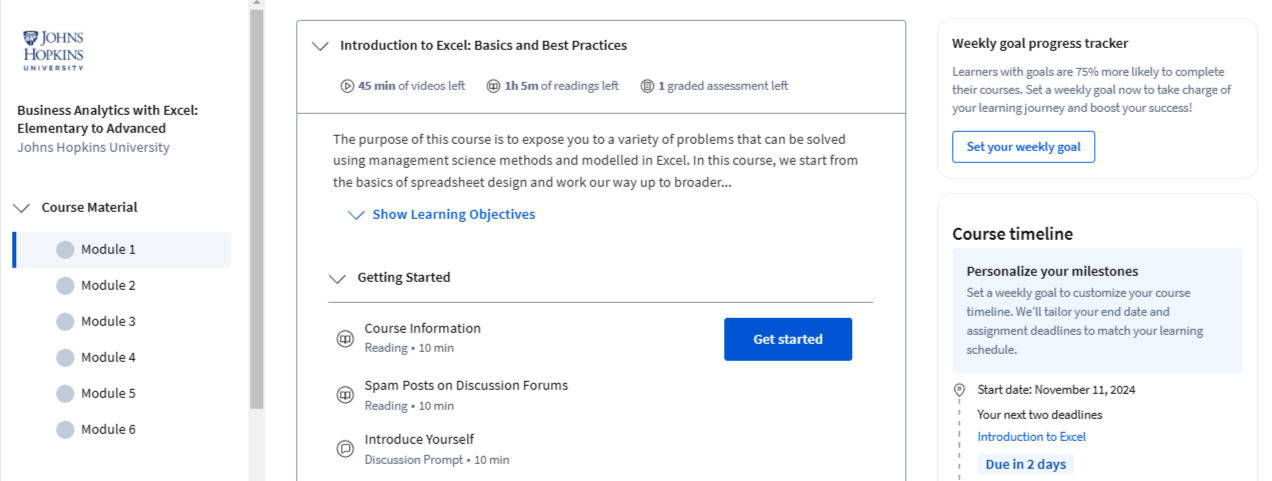
Sign up for Johns Hopkins University’s course on Business Analytics with Excel and you’ll gain immediate access to the content of the 6 modules. You’ll also see a course timeline where you can track your progress.
Click “Get started” to work through the material. This requires a mixture of:
- Reading
- Watching videos
- Practice assignments
- One graded assignment per module
- Discussions with fellow students
Depending on the course, there might be a practical element. In this case, learners are required to access the Microsoft Excel desktop app to complete tasks along the way.
As you work through each part of the course, it is marked with a ✅—you can skip sections and go back at any time but you need to complete the whole thing to pass the course.
It’s a very simple process but does lack personalization. There is also a concern that because of the setup, some of the course content might be out of date.
Coursera's assessment process
Some people who study with Coursera might not care too much about getting a certificate. However, if you want the full experience, you’ll need to complete the graded assignments.
Depending on the course, these will be a mix of:
✏️ Multiple-choice quizzes
✏️ Short answer questions
✏️ Essay-based assignments
✏️ In-video quizzes
✏️ Graded discussions
✏️ Peer reviews
What is peer review in Coursera?
Peer review is where your assignments are marked by your fellow students (rather than the course leader). You’ll also need to peer review a set number of other students’ work to progress.
This can lead to valuable feedback but it is also open to abuse and a poor learner experience. This is because the quality of peer review feedback relies on the effort put in by the other students on the course.
There’s no escaping the fact that some students sign up to Coursera for an easy ride, seeing the platform as a simple way to gain qualifications by clicking through a few screens and making little effort with the assignments.
If you sign up to learn and engage, peer review might be a frustrating process, especially given the lack of direct teacher access and engagement.
Forget peer review and automated check-box quizzes. There is another way…Whop’s creators are personally committed to helping you achieve your goals.
But don’t take our word for it, check out this review of Digital Creator University:
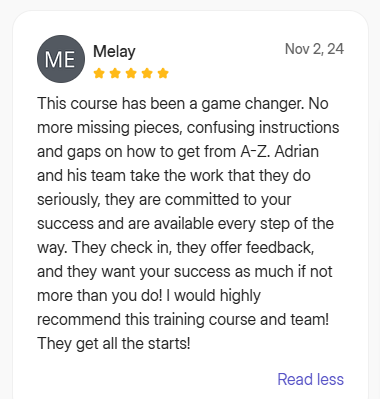
How much does Coursera cost?
As you might expect, given all the course options, Coursera pricing varies widely. Full details of the latest pricing are available on each course page.
However, here is an overview of the options, plus a reminder of the course lengths:
| Duration | Price | |
|---|---|---|
| Guided Projects | 1 to 2 hours | 💲 From $9.99 |
| Free courses | 4 to 12+ hours | 💲 Free (certificates chargeable) |
| Standalone courses | 4 to 12+ hours | 💲 From $49 |
| Specializations | 1 to 3 months | 💲 From $49 a month |
| Professional Certificates | 1 to 6 months | 💲 From $49 a month |
| MasterTrack Certificates | 4 to 7 months | 💲 From $2k |
| University Certificates | 5 to 24 months | 💲 From $4k |
| Degrees | 2 to 4 years | 💲 From $9k |
For standalone courses, you may get the option of a one-time $49 payment that gives you access to the materials for 180 days plus a certificate.
Some courses are genuinely free, with no option for a certificate. However, for eligible free courses, if you want to take the graded assessments and claim a completion certificate, the price starts at $49.
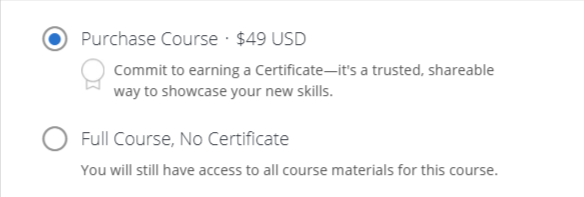
Alternatively, courses may be payable on a monthly basis. So, you pay $49 a month for access to that course and all assessments. Finish the course in a month and you can cancel without paying any more. If you need another month, you pay another $49, and so on.
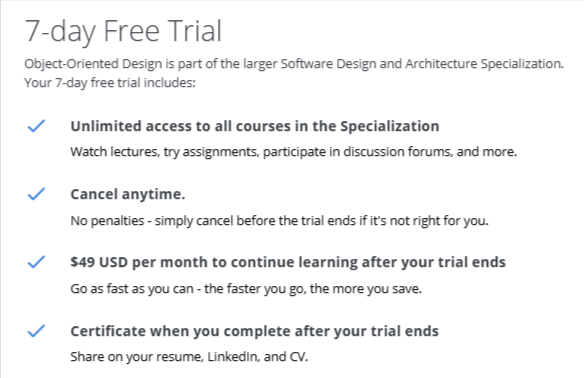
This is also how Specializations and Professional Certificates work—pay $49 a month until you’ve worked through all of the modules and courses.
A 7-day free trial applies, so you can try out Coursera without committing. You can also start with the free option and choose to upgrade later.
On selected courses, there is an option to apply for financial aid. This involves filling out a form. If eligible, you can claim a discount on individual courses. For Specializations, you need to submit a separate financial aid application for each course.
MasterTrack Certificates cost $2k, split into four $500 installments.
University Certificates have individual tuition and fees, which are around $4k to $6k.
Degrees are charged per credit. In the example we used above, the Master of Science in Data Science costs $525 per credit, with 30 credits required to graduate. This means the total degree comes out at $15,750.
Coursera Plus price
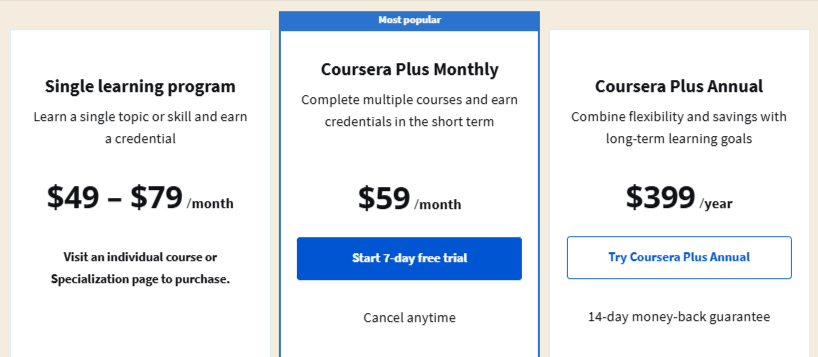
A Coursera Plus subscription costs $59 a month (so, $708 a year), with the ability to cancel at any time. A 7-day free trial applies. The annual option is one single payment of $399. A 14-day free trial applies to this plan.
Coursera for Business price
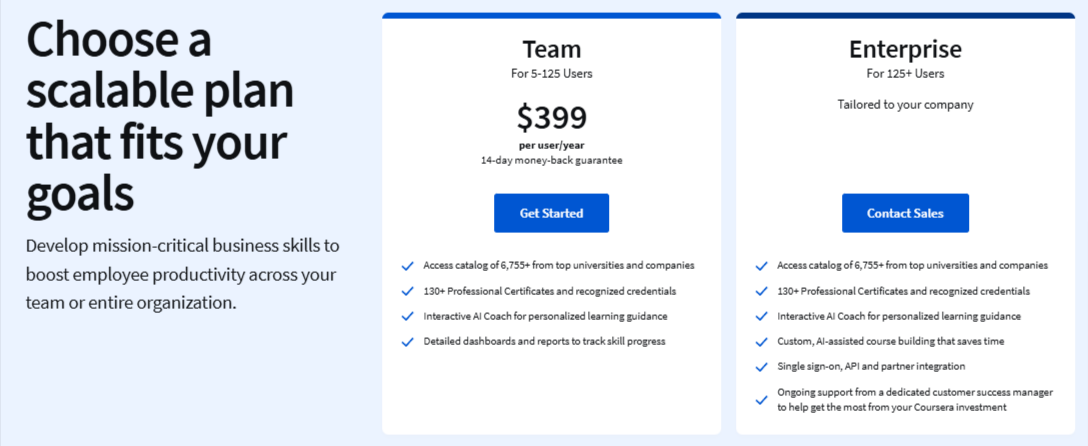
Separate pricing applies if you sign up to Coursera as a business user. This offers group access to 6,755+ courses, including the Professional Certificates (but not full degrees), as well as 200k short videos and labs.
The price per year is $399 per user (from 5 to 125 learners), with a 14-day money-back guarantee. A bespoke enterprise option is available for larger companies.
Not ready to commit $$$ to your learning? Our free “whops” help you get the skills you need for $0:
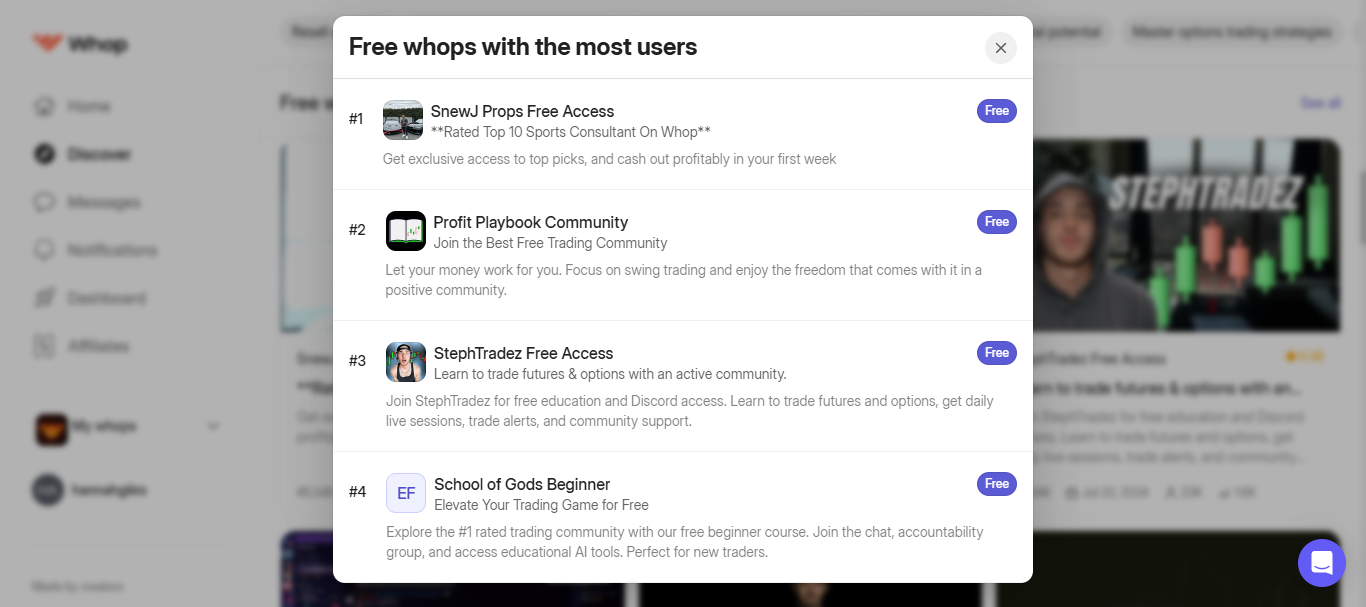
Our verdict on Coursera
Coursera offers learners a wide range of programs, covering business topics and in-demand career skills—as well as arts subjects and languages—all the way to the master’s level.
The main strength of Coursera is that it gives learners worldwide the opportunity to access quality education online from leading educational institutions and to earn recognized professional certifications through companies like IBM, Google, and Microsoft.
However, it’s not all positive…
Firstly (and interestingly, given its reputation), Coursera reviews on Trustpilot are overwhelmingly negative:

The issues flagged fall into two main categories: payments taken in error and poor (i.e. automated) customer service.
Additional complaints relate to technical problems, the peer review aspects of grading, and issues accessing course content. There is also an occasional Coursera course review suggesting the content is not worth the money.
Some of these complaints stem from isolated problems and users’ own errors (i.e. forgetting to cancel a subscription and then getting charged). So, the rating is likely not a fair reflection of most users’ experiences on Coursera, but the reviews are worth keeping in mind.
It’s also a reminder that if you do sign up for Coursera courses, make sure you understand when and how payments will be taken. If you opt for Coursera Plus, review your subscription annually so you have the option to cancel before it’s renewed.
The free courses are a good feature but remember that payment is needed if you want to complete the graded assessments or claim a certificate to share.
How much you enjoy taking courses on this platform also depends on your preferred learning style. A lack of one-to-one interaction with the teachers and a reliance on peer review/AI-powered marking might be off-putting for some learners.
Overall, Coursera is an option to consider if you want to upskill or change careers, or if you need a flexible, distance-learning route to obtaining a degree. It’s also a place to go if you want to explore a subject of interest.
However, there are other platforms where you might find you can gain the knowledge you need more effectively. This is especially true if you want to focus on practical skills (and those that can make you money online) rather than on qualifications and certifications.
Summary of Coursera's pros and cons
| Pros | Cons |
|---|---|
| ✅ Lots of courses | ❌ Not great for all topics |
| ✅ In-demand skills | ❌ Awkward pricing |
| ✅ User-friendly | ❌ Poor reviews |
| ✅ 100% online | ❌ Lack of teacher interaction |
| ✅ Business partner program | ❌ Reliance on peer reviewing |
Learn & grow with Whop
If you've realized that Coursera is not right for you, there is a better option.
Whop is your #1 destination for learning practical skills for making money. From paid courses to free communities, our creators are waiting to help you reach your goals.
Whether you want to start a side hustle or launch a 6-figure (or even 7-figure) business (or both), we’re here to help at every stage. Learn from people who have taken the journey before you and can help you to succeed.
Just testing the waters? Explore Whop’s ever-growing blog to find in-depth guides, reviews, and articles aimed at giving you a deep dive into making money online.
Ready to jump in? Head to Whop to find the perfect learning environment. We have lively communities, accessible teachers, and all the support and encouragement you need to develop skills that can take you to the next level.
Thousands of people like you find what they need here on Whop…and leave the 5-star reviews to prove it.
Here are just two satisfied users of the Wholesale Network Mastermind community, who love the personal learning experience and the opportunity to interact with like-minded entrepreneurs:
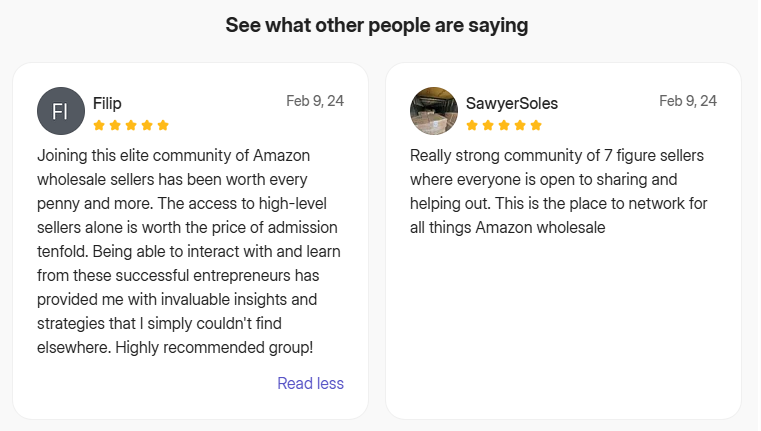
So, what are you waiting for? If becoming an online entrepreneur is your dream, learn how to launch your business on Whop today for free and turn what you learn into cash in the bank.



